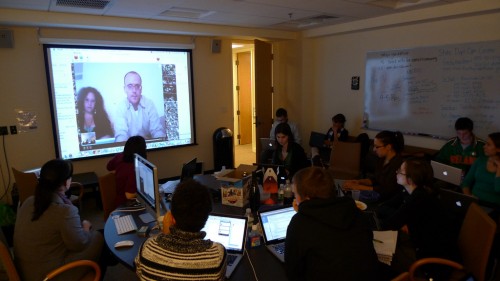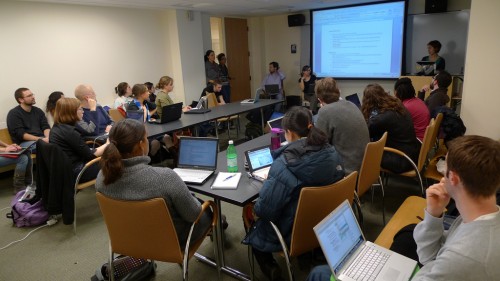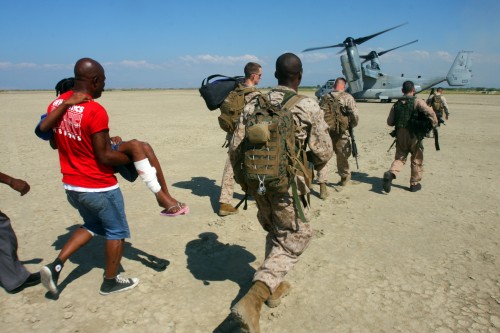When I called David Kobia to launch the Ushahidi platform two hours after the earthquake, our priority was to map all relevant reports in near real-time and to do so around the clock. This meant monitoring Tweets, Facebook groups, list serves, emails, online news media, blogs, radio and television programs, and now incoming SMS. That's not all, we also needed to turn this information into semi-structured reports and actually geo-tag them. No small task. That is why I immediately set up the Haiti Situation Room at The Fletcher School and why my Fletcher colleagues have since set up similar Situation Rooms in Washington DC, Geneva, London and Portland. Tufts undergraduate students have also been phenomenal.

Our awesome volunteers have since processed and mapped the majority of the 1,800 reports currently published on the Ushahidi-Haiti platform. They have vetted reports to make sure the most specific location information is included. If we receive an address, we find the exact GPS coordinates. If we receive an SMS that is unclear, we text back or even call back to get more information. We also verify as many reports as possible. As one of our volunteers explains,
Usually we only mark a report as verified if we have two text messages from different numbers describing the same incident, or a Twitter report confirmed by another source (i.e. SMS or a different website), or information from the ground.
We are doing this manually right now, but with Swift River in the works, we hope to be able to validate crowdsourced information in near real time using automated systems in the future.
We have also provided direct support to key humanitarian actors on the ground including Search and Rescue teams. Our volunteers are in effect running the first Neogeography Operations Center for Disaster Response. Again, no small task.

This is why the public and private encouragement we receive go a long way. Our volunteers are full time students or have full time jobs. They are volunteering their time to make a difference in Haiti. The Situation Room often sounds more like a hospital emergency room than anything else. We even have an English/Haitian Creole Medical Dictionary on hand. The work is emotional, difficult and at times very intense. No surprise then that FEMA has kindly offered our Boston-based volunteers with expert counseling whenever needed. I'm personally awed by the resilience that the team has demonstrated. And I know first hand that the encouragement we receive has a lot to do with that.
[caption id="attachment_1348" align="alignnone" width="500" caption="Source: http://www.marines.mil"] [/caption]
[/caption]
On Wednesday, for example, we received the following kind words from a key contact with the Marine Corps in Haiti:
I cannot overemphasize to you what the work of the Ushahidi/Haiti has provided. It is saving lives every day. I wish I had time to document to you every example, but there are too many and our operation is moving too fast.
Here is one from the 22 Marine Expeditionary Unit: "We had data on an area outside of Grand Goave needing help. Today, we sent an assessment team out there to validate their needs and everything checked out. While the team was out there, they found two old women and a young girl with serious injuries from the earthquake; one of the women had critical respiratory issues. They were evacuated."
Your site saved these people's lives. I say with confidence that there are 100s of these kind of stories. The Marine Corps is using your project every second of the day to get aid and assistance to the people that need it most. [...] Keep up the good work!! You are making the biggest difference of anything I have seen out there in the open source world.
Just after getting this, one of our volunteers relayed the following to us via Skype:
I know everyone is tired, but I'm on the phone with the brother of a victim in Haiti right now who would like to personal thank you for all you do. He can't fathom that strangers would put aside their own lives to the degree you have to help others. He says you are the reason right now he has faith.
Our volunteers really value this kind of encouragement. We have received similar feedback and encouragement from other responders on the ground and wish we had the permission to make this all public.
Where do we go from here? We've already started working closely with the Haitian Diaspora here in Boston. They have provided invaluable support in helping volunteers map Haiti. They are proactive and interested in helping out in any way they can. Our volunteers are thus working with the Diaspora to organize capacity building workshops so they can start taking on the operations of the Situation Room, e.g., processing and mapping incoming SMS's from Haiti.
In parallel to this, we are also in touch contacts directly connected with the Government of Haiti, which today expressed excitement and interest in the Ushahidi deployment. They are eager to adopt the platform in partnership with the Diaspora and domestic civil society groups but don't currently have the capacity to do this—as a high-level disaster response government contact told me on the phone this afternoon,
"We don't even have a building or offices to set this up right now."
This is why we're working with the Haitian Diaspora and why we are also sending our first Ushahidi Field Representative to Haiti in partnership with Internews. One of the priorities for our Field Rep is to identify domestic civil society groups to partner with the Diaspora and the Government of Haiti. Our goal is to hand over full ownership of the Ushahidi deployment as soon as our Haitian partners are ready. In the meantime, our volunteers are on hand to continue running the Neogeography Operations Center for Haiti.